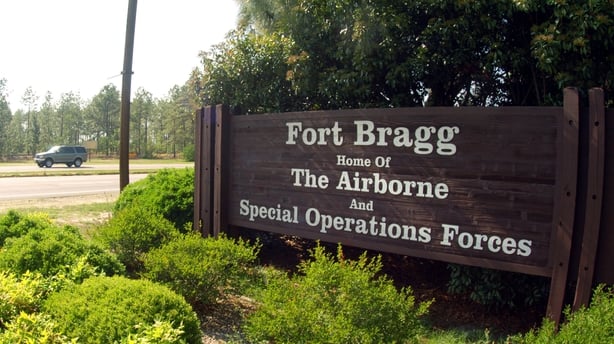President Donald Trump has ruled out renaming US military bases that are named for Confederate leaders even as NASCAR banned the Confederate flag from its races and Democrats sought the removal from Capitol Hill of statues of people representing the pro-slavery South in the 1860s Civil War.
With Americans more conscious about race issues in the wake of the death of African American George Floyd while in Minneapolis police custody last month, Mr Trump drew a line in favour of keeping the names of ten military bases from Virginia to Texas that are named for Confederate military leaders.
His announcement via tweet essentially slapped down those Pentagon officials open to discussing the issue, which has emerged as a way of achieving racial reconciliation.
In the past few days, officials have said that the Pentagon, including Defense Secretary Mark Esper and Army Secretary Ryan McCarthy, was open to having a bipartisan conversation about renaming the army bases named for Confederate leaders.
In a series of tweets, Mr Trump argued the bases have become part of a "Great American Heritage."
"The United States of America trained and deployed our HEROES on these Hallowed Grounds, and won two World Wars. Therefore, my Administration will not even consider the renaming of these Magnificent and Fabled Military Installations...," he wrote.
In recent history, controversies over symbols of the Confederacy, such as statues of its leaders and its battle flag, have erupted.
Those arguing for their removal say they symbolise racism and oppression, while those opposing such action call them signifiers of Southern heritage and pride.
It has been suggested that we should rename as many as 10 of our Legendary Military Bases, such as Fort Bragg in North Carolina, Fort Hood in Texas, Fort Benning in Georgia, etc. These Monumental and very Powerful Bases have become part of a Great American Heritage, and a...
— Donald J. Trump (@realDonaldTrump) June 10, 2020
...Our history as the Greatest Nation in the World will not be tampered with. Respect our Military!
— Donald J. Trump (@realDonaldTrump) June 10, 2020
NASCAR, whose races frequently feature fans waving the Confederate battle flag, said it would ban the "stars and bars" flag from its events.
While some in the South see the flag as a source of pride and a remembrance of soldiers who died fighting for the Confederacy in the 1861-65 Civil War, many Americans see it as a symbol of oppression and slavery.
"The presence of the confederate flag at NASCAR events runs contrary to our commitment to providing a welcoming and inclusive environment for all fans, our competitors and our industry," NASCAR said in a statement.
"Bringing people together around a love for racing and the community that it creates is what makes our fans and sport special.
"The display of the confederate flag will be prohibited from all NASCAR events and properties."
Read:
George Floyd's brother tells US Congress to 'stop' the pain
One of four Minneapolis police charged over Floyd's death posts bail
Tens of thousands take part in anti-racism protests across US
The ten US Army bases named for Confederate officers:
Camp Beauregard
Camp Beauregard in Louisiana is a training centre for the Louisiana National Guard.
It is named after General Pierre Gustave Toutant Beauregard (1818-1893), who was known as "The Little Napoleon" and whose troops fired on Fort Sumter in April 1861, the first salvo of the Civil War.
Fort Benning
Fort Benning in Georgia is home to the US Army Infantry School.
It is named after Brigadier General Henry Benning (1814-1875), an ardent secessionist who argued for the "superiority" of the white race.
Fort Bragg
Fort Bragg in North Carolina is home to the US Special Forces Command and the storied 82nd Airborne Division.
It is named after Major General Braxton Bragg (1817-1876).

Described by a contemporary as "irritable and quarrelsome," Bragg was an inept general and was relieved of command after his defeat in the 1863 Battle of Chickamauga.
Fort Gordon
Fort Gordon in Georgia is home to the US Army Signal Corps and the US Army Cyber Corps.
It is named for Major General John Brown Gordon (1832-1904), who was elected to the US Senate from Georgia after the war and may have once headed the Ku Klux Klan in the state.
Fort A.P. Hill
Fort A.P. Hill is a combined-arms training centre in Virginia.
It is named after Lieutenant General A.P. Hill (1825-1865), who was shot and killed a week before the Civil War ended.
Fort Hood
Fort Hood in Texas is home to such renowned units as the 1st Cavalry Division.
It is named after General John Bell Hood (1831-1879), who suffered a series of notable battlefield defeats during the war for which, according to historians, he had a tendency to blame subordinates.
Hood had to be strapped to his saddle after losing his right leg in the Battle of Chickamauga.
Fort Lee
Fort Lee in Virginia is home to the US Army Quartermaster School.
It is named for General Robert E. Lee (1807-1870), the head of the Army of Northern Virginia whose April 1865 surrender to Union forces effectively ended the Civil War.
Fort Pickett
Fort Pickett in Virginia is a training centre for the state's National Guard.
It is named for Major General George Pickett (1825-1875), whose disastrous "Pickett's Charge" at the 1863 Battle of Gettysburg is seen as a turning point in the Civil War.
Fort Polk
Fort Polk is a US Army training centre in Louisiana.
It is named after Major General Leonidas Polk (1806-1864), an Episcopal bishop who took up arms and was killed in action in 1864.
Fort Rucker
Fort Rucker in Alabama is a training installation for US Army pilots.
It is named after Colonel Edmund Rucker (1835-1924), who lost his left arm and was captured at the 1864 Battle of Nashville, a resounding Confederate defeat.

